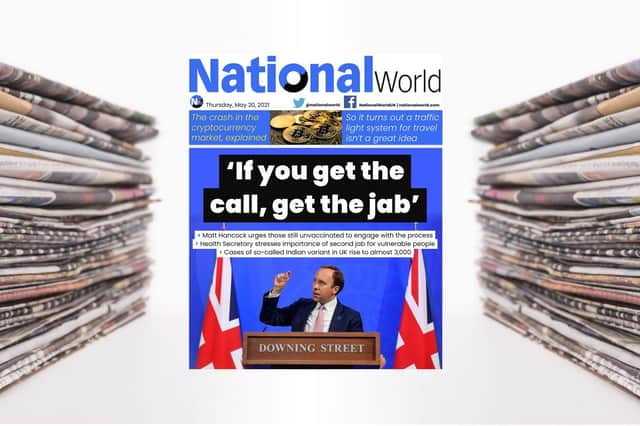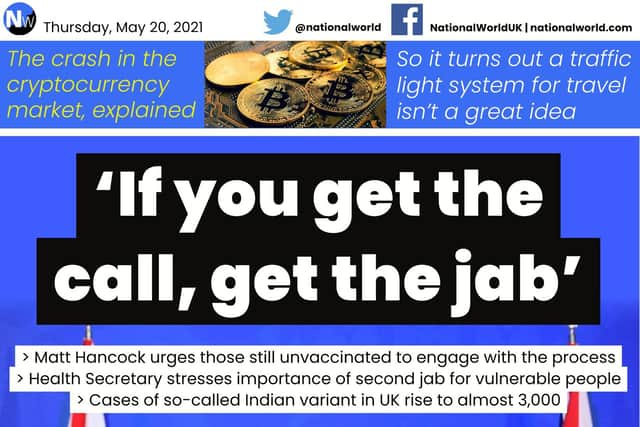‘If you get the call, get the jab’: Matt Hancock’s plea as Indian variant continues to cause concern - NationalWorld digital front page


The health secretary Matt Hancock has urged people to get vaccinated, as concern over the Indian variant continues to grow.
Addressing the nation at today’s Covid press conference, Hancock’s tone was somewhere between confident and apprehensive as he revealed that seven in 10 adults have now received a vaccine, but that despite this progress, we “must proceed with vigilance and everyone taking personal responsibility”.
Advertisement
Hide AdAdvertisement
Hide Ad“If you get the call, get the jab,” he said, in a sign that, at the very least, the government is getting its head around clear, snappy public information messaging.


The health secretary stressed that while early evidence suggests vaccines are effective against the new variant, it also appears to be more transmissible.
He said: “We’ve always known that one of the things that has the potential to knock us off track would be a new variant.
“That’s why we made the presence of the new variant that could do that one of our four tests when we set out the roadmap.
Advertisement
Hide AdAdvertisement
Hide Ad"The early evidence suggests that the new variant passes on more easily person to person than the Kent variant, but as the prime minister said at lunchtime, we have increasing confidence that vaccines are effective against it.”
This means, said Hancock, that it is now “even more important that people get vaccinated”.
There are now 2967 known cases of the Indian variant in the UK, and the government is “throwing everything at it” in Bolton, said Hancock, where the virus is most prevalent and the case-rate has doubled in the past week.
He also revealed that a number of areas will see a marked increase in testing and vaccinations due to the prevalence of the new variant.
Advertisement
Hide AdAdvertisement
Hide AdA bitcoin-fused? Our reporter explains why crypto markets are down
NationalWorld’s Matt Brooks is across all things finance, which of course includes the ever-volatile crypto markets where, today at least, the outlook is not great.
The disruptive alternative currency leaves many people - myself included - scratching their heads, but Brooks’ comprehensive guide to recent developments in the crypto world are comprehensible even to the completely uninitiated.
He writes: “Leading cryptos Bitcoin and Ethereum have endured a turbulent time over the past week as share prices dropped by 37.10% and 42.23% respectively.
“The market crash follows a decision by Tesla to no longer accept Bitcoin as payment for its vehicles, as announced by the car company’s CEO Elon Musk.
Advertisement
Hide AdAdvertisement
Hide Ad“And cryptos took another hit when China said it was going to block initial coin offerings, block exchanges and warned against speculative trading.
Red for stop, green for go, amber for… chance it?
Of all the aspects of the government’s Covid response, the various policies on travel - from bans to corridors, and now, to traffic lights - have perhaps been among the most difficult to follow.
In case the flaws in a system which effectively leaves many countries in an undefined no-man’s-land based on relatively arbitrary criteria aren’t evident, Mitchell sums up some of the issues in a straight-shooting opinion piece.
He writes: “How often do you see drivers speed up as they approach an amber light, desperate to nip through before the light shifts to red? Or just as common, slamming on the brakes when they realise they’ve misjudged it?
Advertisement
Hide AdAdvertisement
Hide Ad“On the amber light, the Highway Code warns that ‘you may go on only if the amber appears after you have crossed the stop line, or are so close to it that to pull up might cause an acciden’”.”
“While the code is clear, human beings tend to interpret the colour amber as “open to interpretation” or “I’ll just chance it”.”
Can you see where this is going?